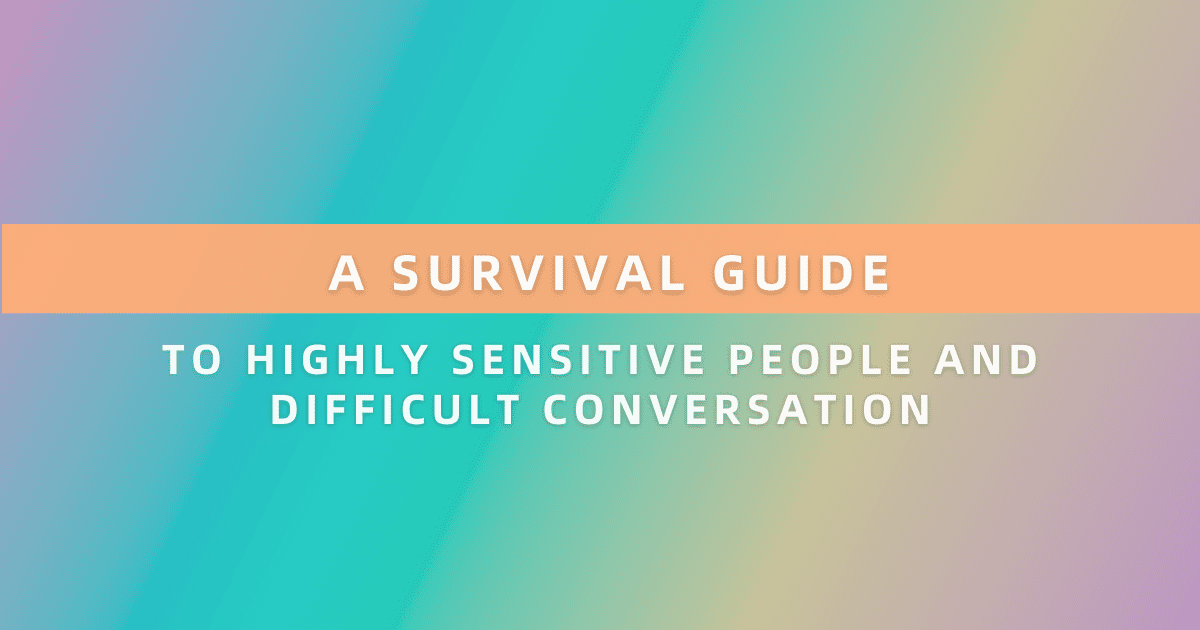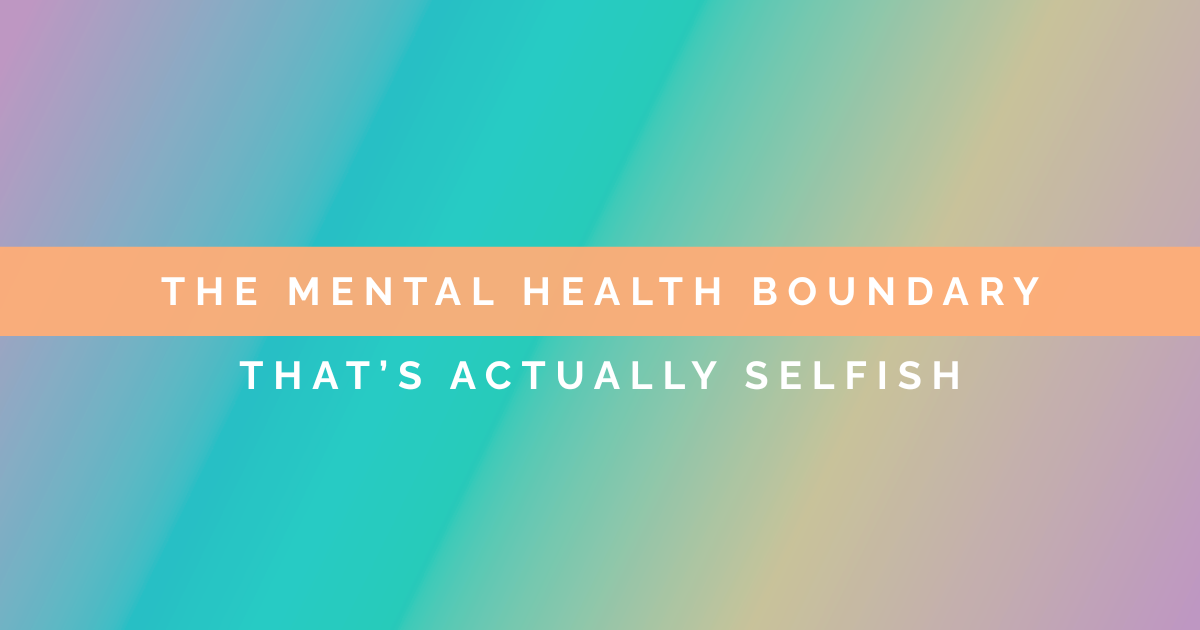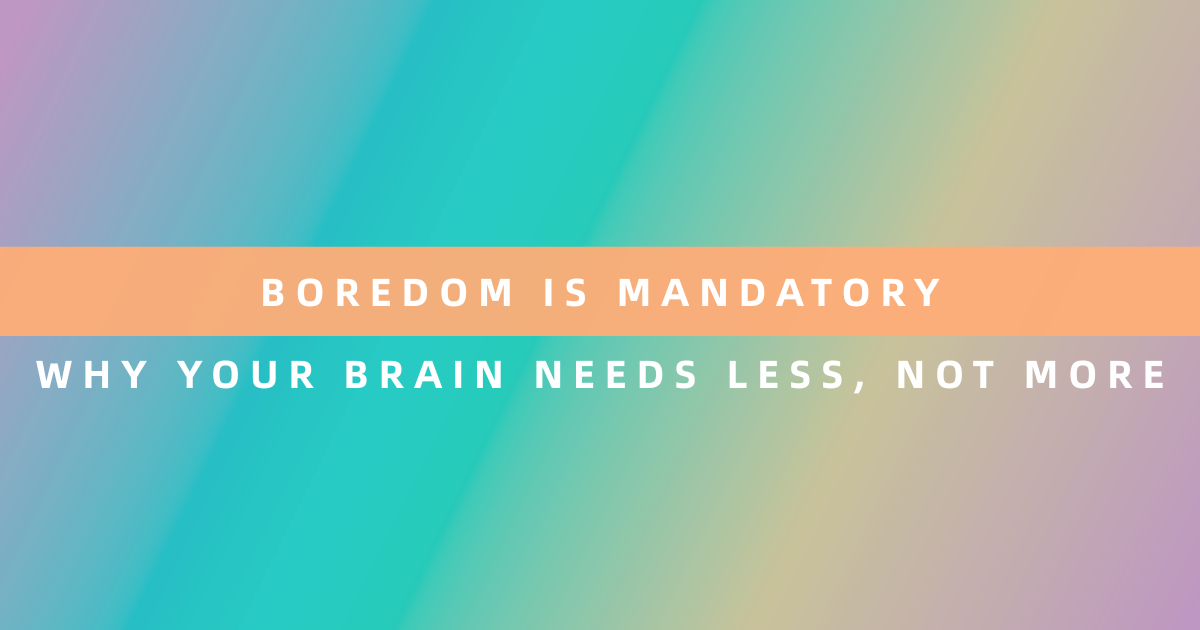Some people have a keen awareness of their emotions and surroundings. This heightened perception enables them to notice subtle details and emotions that others might overlook. This is what it’s like to be a Highly Sensitive Person (HSP), a trait identified by Dr. Elaine Aron and found in about 15 to 20% of the population [1].
When a tough conversation comes up, such as a disagreement, it can be particularly intense for an HSP. While someone else might experience it as minor tension, for an HSP, all the subtle emotional signals and stress can feel incredibly strong and overwhelming. It’s as if their senses are overwhelmed with information.
This intense experience isn’t just mental. Because of their heightened sensitivity, their body can react too [2]. They might notice their heart beating fast, sweating, or feeling mentally foggy. Even just anticipating a difficult conversation can cause days of anxiety, and it can take just as long to recover afterwards.
The important thing to remember is that highly sensitive people have a special way of experiencing the world, especially emotions. This means that tough conversations can feel incredibly intense and even physical for them. But, because they are so good at picking up on feelings and details, when they learn how to handle these conversations, they can become excellent communicators who understand others deeply and build stronger connections.
Understanding Your Sensitive Nervous System During Conflict
If you’re a highly sensitive person, you know that tough conversations aren’t just emotionally challenging; they often feel like a full-body experience. It’s not your imagination, and it’s not a weakness. It’s all about how your unique nervous system is wired [3]. HSPs process information far more deeply than others [4]. This means your nervous system is essentially working overtime, especially when faced with confrontational situations. Understanding this inherent biological reality is the first crucial step toward finding peace and developing truly effective ways to handle conflict.
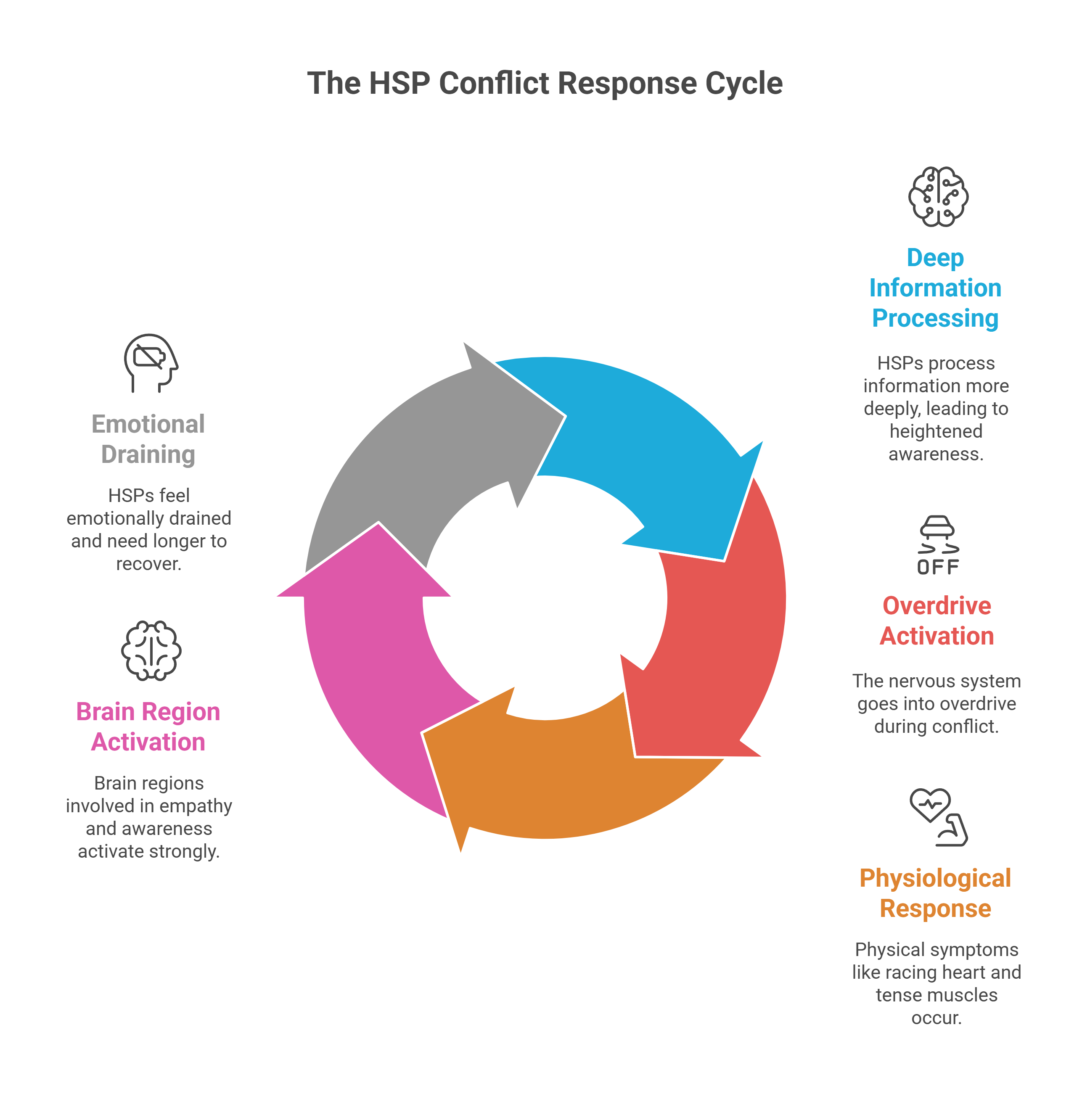
During those tricky conversations, your highly sensitive nervous system doesn’t just get a little flutter; it can truly go into overdrive. While others might experience a mild stress response, for HSPs, it’s often as if their entire internal alarm system is blaring. Your heart might race, muscles can tense up, and your “thinking brain” [5], the part that helps you stay calm and rational, can struggle to stay online. This intense physiological response is precisely why arguments can feel so incredibly draining for you, and why it often takes much longer for you to recover and feel like yourself again.
But what’s happening inside? Research using brain imaging has shed light on this. Studies show that when highly sensitive individuals process emotional social stimuli, there’s often stronger activation in brain regions involved in awareness, integrating sensory information, and empathy, like the insula, cingulate, and parts of the prefrontal cortex [6]. These areas are deeply connected to how you perceive and respond to the world, preparing you for action and deeper understanding. This heightened activity helps to explain why perceived threats and emotional conflict, which count as a threat to your system, can trigger a much stronger internal response. Knowing that your brain is simply wired this way can be incredibly freeing. It helps to normalize what you’re feeling and can lift the heavy burden of self-judgment that often makes stressful situations even worse.
Managing Sensory Overwhelm During Conflicts
Sensory overwhelm during difficult conversations manifests in multiple ways. The other person’s raised voice might feel physically painful. Bright lights suddenly seem unbearable. Background noises that others ignore become impossible to filter out. Even subtle changes in facial expressions or body language can flood the sensitive person’s system with information.
Creating strategies to manage this overwhelm becomes essential. Deep breathing serves as an immediate tool, not just any breathing, but specific patterns that activate the parasympathetic nervous system. Try the 4-7-8 technique: inhale for 4 counts, hold for 7, exhale for 8. This physiological hack signals safety to your nervous system [7].
Grounding techniques provide another layer of support. Feel your feet on the floor. Notice five things you can see, four you can touch, three you can hear, two you can smell, and one you can taste. This 5-4-3-2-1 technique [8] pulls awareness back to the present moment and out of the overwhelming spiral of sensory input.
Pre-Conversation Energy Protection Strategies
Preparation makes an enormous difference for highly sensitive people facing difficult conversations. Energy protection isn’t about building walls; it’s about creating sustainable boundaries that allow for genuine connection while maintaining your wellbeing.
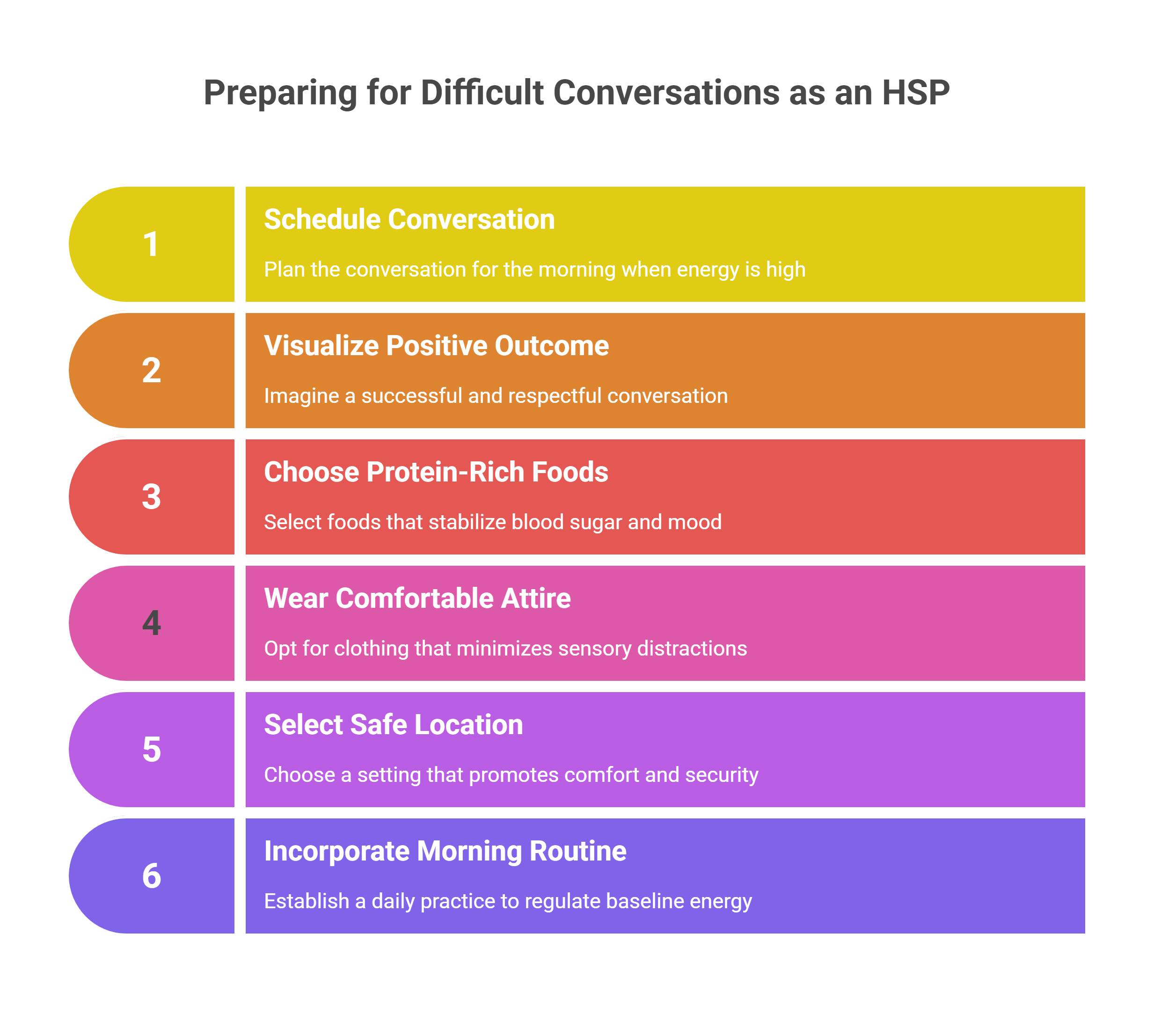
One of the most impactful strategies involves thoughtful scheduling. As an HSP, your energy reserves fluctuate significantly. You’ll likely find that challenging discussions are best undertaken earlier in the day, when your mental and emotional capacities are at their peak. It is advisable to avoid these conversations when you are already depleted from professional demands, social engagements, or other pervasive stressors. Crucially, allocate sufficient buffer time afterward for processing and recovery. Your sensitive system requires this dedicated space to recalibrate.
Visualization techniques prove particularly effective for HSPs. Spend time before the conversation imagining yourself surrounded by protective light or energy. Picture roots growing from your feet into the earth, keeping you grounded. Visualize the conversation going well, with both parties feeling heard and respected. This mental rehearsal primes your nervous system for a positive experience.
Your physical state significantly impacts your capacity. Choose protein-rich foods beforehand for stable blood sugar and mood. If caffeine increases anxiety, avoid it. Wear comfortable attire to minimize sensory distraction. Whenever possible, select a safe, comfortable location. These choices, though seemingly small, profoundly enhance your ability to stay centered. Consider incorporating brief daily practices, like a 5-minute morning routine, to build a more regulated baseline.
Creating Your Conversation Toolkit
Having specific tools ready transforms how highly sensitive people experience difficult conversations. Think of this as your emergency kit, resources you can access when emotions run high or overwhelm threatens.
Develop phrases that buy you time: “I need a moment to think about that,” or “Let me process what you’re saying.” These simple statements create space for your nervous system to regulate without abandoning the conversation entirely.
Body-based tools prove especially valuable. Progressive muscle relaxation, tensing and releasing muscle groups, can happen subtly even while sitting across from someone. Bilateral stimulation, like alternately pressing your toes into the ground or gently tapping your fingers on your legs, helps integrate overwhelming emotions.
Keep a conversation journal where you track what works. Note which environments feel most supportive, what time of day serves you best, and which preparation strategies prove most effective. This personal data becomes invaluable for future difficult conversations.
Having specific tools ready transforms how highly sensitive people experience difficult conversations. These are crucial, especially when facing the digital age dilemmas that make conversations harder.
Recovery Strategies for HSPs After Difficult Conversations
Recovery isn’t optional for highly sensitive people; it’s essential. The depth of processing that occurs during difficult conversations requires dedicated integration time. Without proper recovery, the effects compound, leading to increased sensitivity and decreased resilience over time.
Immediate recovery strategies focus on nervous system regulation. Take a warm shower or bath to wash away the energetic residue of the conversation. Gentle movement like walking, stretching, or yoga helps discharge accumulated tension. Avoid the temptation to immediately replay the conversation. Give your system time to settle first.
Create a recovery ritual that signals to your nervous system that the stressor has passed. This might include changing clothes, listening to calming music, spending time in nature, or engaging in a creative activity. The key is consistency; your nervous system learns to recognize these activities as signals of safety and can downregulate more quickly.
Extended recovery involves processing the conversation’s content once you’ve regulated physically. Journaling helps integrate insights and release lingering emotions. Talking with a trusted friend or therapist provides an external perspective. AI-enhanced journaling tools can offer additional support, helping identify patterns and providing personalized insights based on your unique sensitivities.
Utilizing Sensitivity as a Communication Strength
The very sensitivity that can make difficult conversations challenging for highly sensitive people is, paradoxically, also their greatest communication asset. Your heightened awareness means you naturally perceive subtle emotional nuances, pick up on non-verbal cues, and register unspoken needs that others often miss. This profound depth of perception is the bedrock of exceptional communication.
Because HSPs process information deeply, they possess an innate capacity for genuine empathy [9]. This depth enables you to forge meaningful connections, navigate complex emotional landscapes with remarkable insight, and offer validating responses that make others feel truly seen and heard. When channeled effectively, this sensitivity transforms you into an extraordinarily skilled communicator, capable of fostering deeper understanding and stronger relationships, even in the face of conflict.
Creating Optimal Environments for Sensitive Conversations
The environment profoundly impacts highly sensitive people’s ability to navigate difficult conversations successfully. Taking control of environmental factors whenever possible sets the stage for more productive discussions.
Physical setting truly matters. Whenever possible, opt for locations with minimal sensory distractions. Think soft lighting over harsh fluorescents, comfortable seating that allows you to relax, and an environment with minimal background noise. Natural settings, like a quiet park bench or even a window with a calming view, often prove beneficial, as nature tends to regulate sensitive nervous systems. If you’re meeting in a public place, try to arrive early to select optimal seating away from high-traffic areas, giving yourself a head start on calm.
Timing considerations extend beyond simply scheduling. Be deeply aware of your personal rhythms: when do you feel most resourced? Are you a morning person, or do your insights peak in the afternoon? Also, consider the other person’s patterns. Avoid initiating these talks when either party is likely to be hungry, tired, or already stressed from other obligations. And crucially, build in transition time both before and after the conversation, rather than scheduling back-to-back activities. This breathing room allows for mental preparation and essential recovery.
Virtual conversations offer distinct advantages for highly sensitive people. The ability to control your immediate environment is a huge benefit. You can also discreetly take micro-breaks by momentarily turning off your video or having grounding objects (like a stress ball or a comforting stone) nearby without any social awkwardness. Don’t hesitate to suggest phone or video calls when you know they’ll better serve your needs, giving you a greater sense of control and comfort in a challenging situation. For more on this, explore Remote Work Boundaries and Handling Conversations Between Screens.
Managing Workplace Conflicts as an HSP
Professional environments present particular challenges for highly sensitive people during conflicts. The need to maintain composure while processing intense emotions, combined with power dynamics and professional consequences, adds layers of complexity.
Preparation becomes even more crucial in workplace settings. Document concerns beforehand to stay focused if emotions rise. Practice key points aloud to build muscle memory. Consider bringing notes; this isn’t a weakness but rather a tool for clarity. Request agenda items in advance when possible to avoid surprise confrontations.
Establish professional boundaries that honor your sensitivity. This might mean requesting time to consider feedback before responding, scheduling difficult conversations rather than having them spontaneously, or asking for written follow-ups to verbal discussions. Frame these needs in terms of thoroughness and professionalism rather than sensitivity.
Build alliances with colleagues who understand and respect your processing style. Having even one person who recognizes when you need support can transform workplace dynamics. Consider sharing articles about high sensitivity in professional settings to increase understanding without making it overly personal.
Long-Term Strategies for Building Resilience
Building resilience as a highly sensitive person doesn’t mean becoming less sensitive; it means developing sustainable ways to navigate a world that often feels too intense. This involves both inner work and external strategies.
Regular nervous system care prevents the accumulation of stress that makes difficult conversations harder. Daily practices like meditation, time in nature, creative expression, or gentle exercise create a more regulated baseline. Think of this as preventive medicine for your sensitive system.
Boundary setting becomes an ongoing practice rather than a one-time decision. Learn to recognize early signs of overwhelm and honor them before reaching crisis points. This might mean limiting social interactions before important conversations, saying no to additional stressors during challenging periods, or building in recovery time as non-negotiable.
Seek out relationships and communities that understand and value sensitivity. Whether through HSP support groups, online communities, or friendships with fellow sensitive souls, having places where your trait is understood reduces the overall stress load. These connections provide both practical strategies and emotional validation.
Embracing Conflict as a Highly Sensitive Person
The path from dreading difficult conversations to engaging them with genuine confidence is entirely achievable for highly sensitive individuals. It begins with a fundamental acceptance of your sensitivity, not as a burden, but as an inherent, powerful aspect of who you are. Alongside this acceptance, the journey involves cultivating specific skills designed to support your unique nervous system.
Every successful encounter with a challenging conversation builds crucial evidence, reinforcing your belief that you possess the capacity to navigate these moments. Over time, that familiar wave of anticipatory anxiety begins to recede, as your nervous system gradually learns that conflict does not equate to complete overwhelm. You start to cultivate a deep trust in your ability to remain centered, articulate your needs effectively, and recover with resilience.
As you continue on this path of embracing your sensitivity, remember that deeper self-understanding is your greatest tool. If you’re seeking gentle ways to observe your emotional patterns, reflect on your journey, and gain insights that genuinely support your well-being, Theryo is here to help. It is developed to illuminate your unique process, making your steps toward greater confidence feel clearer and supported.
FAQs
Q: Why do difficult conversations feel so much harder for highly sensitive people?
Highly sensitive people have nervous systems that process information more deeply and thoroughly. This means they pick up on more subtle cues, experience emotions more intensely, and need more time to process interactions. During conflicts, this can lead to sensory overwhelm and stronger physiological responses than non-HSPs experience.
Q: Can I become less sensitive to handle conflicts better?
High sensitivity is an innate trait, not something to be fixed or changed. Rather than trying to become less sensitive, focus on developing strategies that work with your sensitivity. Many HSPs find that accepting and working with their trait leads to better outcomes than fighting against it.
Q: How can I explain my needs to others without seeming weak or difficult?
Frame your needs in terms of what helps you contribute most effectively. For example: “I process information thoroughly, so having time to think before responding helps me give you my best insights,” or “I’ve found I’m most focused in quieter environments. Could we meet in the conference room instead?”
Q: What if I cry during difficult conversations?
Tears are a normal physiological response for many HSPs. Keep tissues handy, take deep breaths, and if needed, say something like “I’m processing a lot right now; these tears don’t mean I’m not handling this, just that I feel things deeply.” Most people respond with understanding when you acknowledge what’s happening calmly.
Q: How long should recovery take after a difficult conversation?
Recovery time varies based on the intensity of the conversation and individual needs. Some HSPs need a few hours, others need days. Trust your system and avoid comparing your recovery needs to others. The key is allowing whatever time you need without judgment.
Q: Can medication help with overwhelming sensitivity during conflicts?
While some HSPs find medication helpful for anxiety or mood regulation, high sensitivity itself isn’t a disorder requiring medication. Focus first on environmental modifications, coping strategies, and nervous system regulation. Consult healthcare providers if you’re considering medication options.
Q: How do I handle surprise confrontations when I can’t prepare?
Develop a quick-response protocol: Take three deep breaths, ground yourself by feeling your feet on the floor, and use a standard phrase like “This feels important. Can we schedule a time to discuss it properly?” Having these automatic responses helps buy time to regulate.
Q: What if my workplace doesn’t understand high sensitivity?
Focus on communicating your needs in terms of productivity and effectiveness rather than sensitivity. Request accommodations based on what helps you perform best. Document successful strategies and outcomes to build evidence for your approach.
Q: Can therapy help highly sensitive people with difficult conversations?
Absolutely. Therapists familiar with high sensitivity can help develop personalized strategies, process past difficult experiences, and build confidence. Some HSPs particularly benefit from somatic therapies that address the body’s response to stress.
Q: How do I know if I’m highly sensitive or just conflict-avoidant?
High sensitivity involves deep processing across all areas of life, not just during conflict. HSPs often notice subtleties others miss, feel deeply moved by art or nature, and need downtime after stimulating experiences. Conflict avoidance alone doesn’t indicate high sensitivity, though many HSPs do develop conflict avoidance as a coping mechanism.
Q: Can AI tools help highly sensitive people with difficult conversations?
AI-enhanced mental health tools can provide valuable support by helping HSPs process conversations, identify patterns in their responses, and develop personalized strategies. These tools offer a judgment-free space to explore feelings and practice responses, which many sensitive people find helpful.
Q: Should I tell people I’m highly sensitive before difficult conversations?
This depends on your relationship and comfort level. With trusted individuals, sharing can increase understanding and improve communication. In professional settings, you might focus on specific needs without using the HSP label. Trust your intuition about what feels right in each situation.
References
[1] https://www.medicalnewstoday.com/articles/highly-sensitive-person
[2] https://osf.io/preprints/psyarxiv/w53yc_v1
[3] https://www.britannica.com/science/human-nervous-system/Emotion-and-behavior
[4] https://pmc.ncbi.nlm.nih.gov/articles/PMC4086365/
[5] https://www.google.com/search?q=%22thinking+brain
[6] https://pmc.ncbi.nlm.nih.gov/articles/PMC4086365/
[7] https://www.medicalnewstoday.com/articles/324417
[8] https://www.urmc.rochester.edu/behavioral-health-partners/bhp-blog/april-2018/
[9]https://drelaynedaniels.com/the-importance-of-authenticity-for-highly-sensitive-people-hsps/


